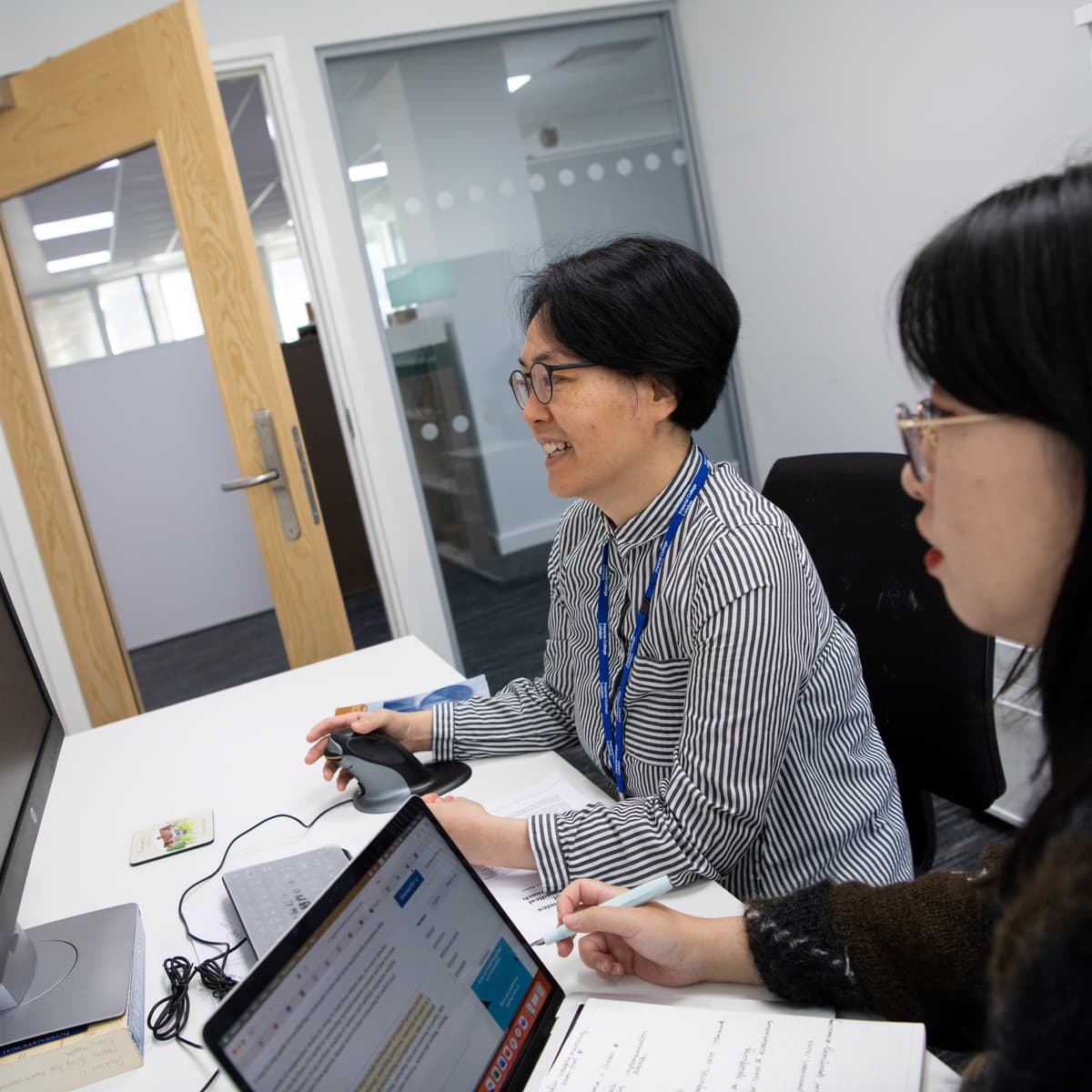
Our competency framework covers three career stages and for each stage, clarifies the range of skills and experience that we expect you to demonstrate, which includes:
your current research experience and impact at the time of applying
your future research ambitions that we expect you to develop during the fellowship
your wider supporting and enabling skills at the time of applying, which will help you deliver on your research ambitions
The competencies outlined in the framework should be considered holistically. You might be able to demonstrate excellent skills or experience in several competencies, or some skills or experience across all competencies.
You will be assessed based on your body of work and its impact and influence in your field, and on your proposed research. The specific funding scheme guidelines outline the assessment criteria that the committees will use to make the final funding decision.
The translational skills and experience in the framework will be included in our assessment processes to ensure translational efforts are being recognised and valued on par with other scientific outputs such as publications, which forms part of our implementation of Declaration on Research Assessment (DORA) principles.
Explore opportunities by career stage
Learn about the DORA principles
Stage | Relevant schemes |
|---|---|
Develop independence: Developing your career in a specific field of research | |
Establish independence: Ready to establish your own independent cancer research programme | |
Transition to scientific leadership: Further developing your programme and becoming an internationally recognised leader in your field |
For researchers developing their career in a specific field of research.
At the time of applying you should have:
evidence of developing independent research ideas
started to make important research contributions through a range of outputs* where appropriate. Includes invention disclosure, IP protection, licencing, connecting with translational partners or spin-out activity
started to build your own research network independent from your current group leader/supervisor/mentor for example, through presenting at scientific meetings, through arranging visits to other academic or commercial research groups to develop relevant skill-sets, involvement in sandpit workshops
an awareness of research in other fields/disciplines and how your own research could benefit from working across disciplines
started to develop an understanding of the importance of translating academic research outputs into healthcare innovations that will benefit patients, and the role played by commercial organisations to facilitate this for example, through relevant translational/entrepreneurial workshops or courses
*Research outputs may include but are not limited to preprints, training delivered, contribution to consortia, community outreach, patents, key datasets, software, novel assays and reagents and publications. We are a DORA signatory and therefore we consider the value and impact of all research outputs.
During the course of the fellowship you should develop:
your own cancer research plans with support of relevant sponsors and mentors
clear plans for the future to transition to an independent cancer research career
your research network through collaborations within or outside of your current institution and/or disciplines
an understanding of the different routes by which research can be translated into patient benefit and how to engage with these
an appreciation of how to pursue translation of your own research and the potential barriers/challenges (if appropriate)
At the time of applying you should have:
identified appropriate (clinical/non-clinical) career development opportunities for example, awareness of mentoring schemes offered, industrial placements, spending time in other research groups
plans to develop relevant skills and knowledge to drive the development of your own cancer research ideas for example, clinical trial or population study design skills, data analysis courses, development of specific lab-based techniques, networking, grant writing skills
evidence of balancing other commitments for example, clinical, translational/entrepreneurial, teaching, supervision activities
started to develop an awareness of the translational/entrepreneurial skills and experience needed to facilitate translation of research and if appropriate, plans to participate in the relevant training to obtain these skills for example, IP/patent workshops, business plan competitions, spending time in industry, sandpits, identifying clinical need, understanding of health systems/economics
At the time of applying you should have:
started to develop leadership skills for example, by organising workshops, supporting supervision of students/interns, being a member of clinical committees or working groups.
At the time of applying you should have:
demonstrated effective communication skills across different audiences through for example, scientific meetings, PhD/postdoc forums, public science fairs, patient involvement (where appropriate).
For researchers ready to establish their own independent cancer research programme.
At the time of applying you should have:
a track record of novel and innovative research that demonstrates impact in your field and applicability to cancer research through a range of outputs*, where appropriate includes invention disclosure, IP protection, licencing, connecting with translational partners or spin-out activity
started to build relevant collaborations within or outside of current institution and/or disciplines for example, impactful collaborative research outputs and/or leveraged funding
started to be identified for your expertise in your field through for example, peer review experience, selected to present at conferences
a plan for sharing your own research outputs* and enabling the wider research community via for example, publishing, data deposit archive, data sharing platforms
started to engage with the network needed to facilitate translation of your research for example, technology transfer infrastructure, other aligned research groups, accelerators, clinicians, commercial partners (if appropriate)
*Research outputs may include but are not limited to preprints, training delivered, contribution to consortia, community outreach, patents, key datasets, software, novel assays and reagents and publications. We are a DORA signatory and therefore we consider the value and impact of all research outputs.
During the course of the fellowship you should develop:
your own, novel cancer research niche that will not significantly overlap with your previous PIs or competitors
the research autonomy to independently drive, develop and manage a novel and innovative cancer research programme that goes above and beyond your current research activities
a reputation for excellence in your research field
your international research network through national/international collaborations (across disciplines, including with commercial organisations) across disciplines (where appropriate) that may enable future team science (and facilitate translation if appropriate)
a vision for the potential clinical impact of your research and the pathway to achieve it (if appropriate)
At the time of applying you should have:
identified appropriate (clinical/non-clinical) career development support at your host research environment, through the establishment of a network of (local) collaborators and by identifying suitable mentors (including those needed to help support the translation process if appropriate)
plans to develop relevant skills and knowledge to drive the development of your own independent cancer research group for example, training on designing & managing a research programme, management & leadership training, research admin
evidence of balancing other commitments for example, clinical, translational/entrepreneurial, teaching, supervision activities
started to develop your translational skills and network, including having participated in relevant training/activities for example, IP/patent workshops, business plan competitions, spending time in industry, sandpits, understanding of health systems/economics (if appropriate)
an appreciation of the route to patient benefit for your discoveries/technology (if appropriate)
At the time of applying you should have:
demonstrated leadership skills through for example, providing supervision and career development support for PhD/MSc students and/or technical staff, leading clinical committees or working groups, coordinating clinical audits.
At the time of applying you should have:
evidence of communicating and sharing your own research outcomes effectively with the wider community through for example, scientific meetings, (social) media engagement, patient involvement (where appropriate).
For researchers further developing their programme and becoming an internationally recognised leader in their field.
At the time of applying you should have:
an established track record and future research plans that demonstrate the ability to deliver and plan novel and innovative research that has impact and international recognition in your field and applicability to cancer research through a range of outputs*, where appropriate includes invention disclosure, IP protection, licencing, connecting with translational partners or spin-out activity
evidence of successful national/international collaborations (across disciplines, including with commercial organisations) for example, collective research outputs and/or leveraged funding, funded commercial research collaborations, IP protected and exploited
evidence of influence in the international community through for example, invites to peer review and scientific committees/panels, invites to present at international conferences, awards
evidence of leveraged independent research funding through for example, intermediate fellowships, project funding, industrial support
evidence of sharing your own research outputs* and enabling the wider research community via shared (data) resources
a vision for the potential clinical impact of your research and the pathway to achieve it (if appropriate)
*Research outputs may include but are not limited to preprints, training delivered, contribution to consortia, community outreach, patents, key datasets, software, novel assays and reagents and publications. We are a DORA signatory and therefore we consider the value and impact of all research outputs.
During the course of the fellowship you should develop:
a long-term scientific direction for your own independent cancer research group
a reputation as a cancer research leader who influences your chosen research field and the wider scientific community, and, if applicable, successfully translates their findings into innovations that benefit patients
an established international research network that may drive (cross-disciplinary and translational) team science
At the time of applying you should have:
identified appropriate (clinical/non-clinical) career development support at your host research environment, through the expansion of a network of local and international collaborators and by identifying suitable mentors (including those needed to help support the translation process if appropriate)
clear plans to drive the career and scientific development of your staff through for example, signposting relevant skills- and knowledge-based training, clinical/non-clinical mentoring, setting and managing individual career expectations
evidence of balancing other commitments for example clinical, translational/entrepreneurial, teaching, supervision activities
evidence of relevant translational/entrepreneurial skills and experience needed to facilitate the translation of your research (if appropriate)
evidence of relevant translational/entrepreneurial skills and experience needed to facilitate the translation of your research (if appropriate)
clear plans to encourage and support translation within your research group (if appropriate)
At the time of applying you should have:
evidence of leadership skills through for example managing and providing career development support for your own research group, identifying talented postdocs and support acceleration of their independency, leading a clinical unit or clinical screening programme.
At the time of applying you should have:
a track record of communicating and sharing your own research outcomes effectively with the wider community through for example scientific conferences, (social) media engagement, patient involvement (where appropriate).
Career breaks due to personal circumstances, part-time working and changes in discipline will be taken into consideration by our panels and committees to make appropriate adjustments when assessing your record of outputs, research achievements and career progression.
Before applying, you will need to assess your suitability for a particular career stage and fellowship funding scheme, and then discuss your application with your host institution. Specific ‘eligibility’ rules may also apply for individual fellowship funding schemes.
If you need further guidance, please contact the relevant Research Grants Manager listed on each funding scheme, who can advise on your suitability for a particular fellowship scheme. When contacting us, please include:
a short CV, including key research outputs
one page (maximum) abstract of your proposed research
a short description of why you’re applying for a particular fellowship and how you meet the expected skills and experience

Our research careers programme managers are here to help our research community and advise researchers who are interested in making an application. Email us to access support.

Our columnists are getting into the weeds of what makes research careers more productive, more rewarding and more successful.

Stay up to date with research funding and partnership opportunities, networking events and conferences and other research news.